This article was co-authored by Liana Georgoulis, PsyD. Dr. Liana Georgoulis is a Licensed Clinical Psychologist with over 10 years of experience, and is now the Clinical Director at Coast Psychological Services in Los Angeles, California. She received her Doctor of Psychology from Pepperdine University in 2009. Her practice provides cognitive behavioral therapy and other evidence-based therapies for adolescents, adults, and couples.
There are 16 references cited in this article, which can be found at the bottom of the page.
wikiHow marks an article as reader-approved once it receives enough positive feedback. This article received 24 testimonials and 83% of readers who voted found it helpful, earning it our reader-approved status.
This article has been viewed 392,623 times.
Dealing with a psychopath can be frightening, but there are ways to avoid being victimized. Psychopathy is a form of antisocial personality disorder, and is characterized by a lack of empathy, disregard for rules, and impulsive behavior.[1] If you can’t avoid interacting with a psychopath, deal with them calmly. Don’t engage them, since getting upset shows them that they can control you. Get help if feel unsafe, and learn to recognize signs that someone might be emotionally or physically abusive.
Steps
Ending a Relationship with a Psychopath
-
1Call emergency services if you’re in immediate danger. Get help immediately if the person has threatened to hurt you, themselves, or other people. Take their threats seriously, even if they haven’t been physically violent in the past.[2]
- Not all people with antisocial personality disorder are physically violent, but sudden aggression and reckless behavior are associated with the condition.
- Threatening to commit suicide might be a tactic to manipulate your emotions. If you believe they have the intent and means to hurt themselves, call emergency services.
- If you suspect they’re threatening suicide to control you or have repeatedly threatened to harm themselves, stick to your boundaries. Tell them that you are not responsible for their actions and will not allow them to control you.[3]
-
2Remember that you're not responsible for their actions. Psychopaths are experts at manipulation, deception, and shifting the blame away from themselves. Your situation doesn’t have anything to do with you being naive or an easy target. Instead of blaming yourself, understand that they mistreated you and that you're not responsible for their behavior.[4]
- The point to bear in mind is that a psychopath typically seems friendly and personable at first. They might have been charming for weeks, then you eventually started noticing red flags. Suppose they disappeared for a couple of days, and when you asked them where they went, they blew up at you, threatened violence, and said it's none of your business.
- Additionally, remember that you’re not alone. A person with psychopathic tendencies disregards the wellbeing of others, and treats everyone they encounter as an object. Remind yourself that you are not the first person they’ve mistreated.
Advertisement -
3Trust your instincts if you suspect your relationship is unhealthy. Listen to your gut if you feel like you walk on eggshells around this person. If the idea of interacting with them fills you with dread, it’s time to leave.[5]
- You might be on the fence because you enjoy their company when they're nice. However, ask yourself if they're only nice when you do things for them. Suppose they ask you to drive them somewhere and you say you can't. If they blow up at you, they're probably only charming you to get what they want.
- Keep in mind you might not experience outright fear. Trust your gut if you feel that this person always seems to turn the blame on you, constantly lies, takes advantage of you, suddenly becomes aggressive, or doesn’t seem to care about your physical or mental health.
-
4Learn to set and defend personal boundaries. Psychopaths are known to push and test boundaries, especially if they are unclear. As you move past your relationship, learn to set limits and defend them. Take some time to inventory your emotions, and come up with boundaries that will protect you from having those emotions manipulated or invalidated.
- For example, you might completely redecorate your home so that you do not associate your surroundings with the person who manipulated you. You could also set a boundary that says no moving in or sharing a bank account with a new person until you two have gone through a round of couple's therapy.[6]
- Remember that you always have the right to say no. You don't owe any explanation, and you are under no obligation to change your mind.
- Be sure to set boundaries that will protect you for your physical, emotional, and financial future.
-
5Cut off all contact when you end the relationship. The best way to deal with a psychopath is to detach yourself from them and any situations that involve them. Break things off, then don’t communicate with them. It might seem harsh, but terminating the relationship is best for your emotional and physical wellbeing.[7]
- Don’t look at their social media profiles, resist urges to call or text them, and don’t allow yourself to second-guess your decision. If this person has subjected you to emotional, verbal, or financial abuse, they have no business being in your life.
- Breaking up is never easy, but stay strong and don't succumb to guilt. Realize that you are not abandoning them in their time of need; you are just protecting yourself.
- Remember that you’re not their counselor or psychologist, and you can’t force them to change. A person with antisocial personality disorder isn’t going to change without professional help, but most people with the disorder reject treatment.[8]
-
6Develop a safety plan if you believe they might become violent. If you’re concerned that ending the relationship could result in violence, consider breaking things off over the phone or via email. If you live with the person, ask trusted relatives or friends to help you get out of the situation safely.[9]
- Memorize important phone numbers and, if possible, get a second cell phone that they can’t access. Before leaving, gather your vital documents and, if you can safely do so, transfer money and deposit your income into a new bank account.
- Make a copy of your car keys and hide them in a secure place.
- Arrange to stay with a friend or family member. If you don’t have any local trusted friends or relatives, you can stay at a shelter for victims of domestic violence.
-
7Get a restraining order if you’re worried about your safety. Go to your local courthouse, tell the clerk you’d like to petition for an emergency protective order, and ask for filing instructions. Call ahead or check their website to see if you need to schedule an appointment.
- Ask a trusted friend or relative to go with you for moral support.
- You do not need a lawyer to petition for a protective order, nor do you need to pay any filing fees.
- Provide the abusive person’s work and home addresses, and bring any evidence with you, such as medical bills, photographs, or police reports.
-
8Lean on your support system. Breaking up with someone is tough enough, and getting out of an unhealthy relationship is especially difficult. Your family and friends can help you get through it, so vent your feelings to them and spend quality time together. Psychopaths aim to isolate their targets, but your loved ones can help you stay objective and affirm that getting out of the situation is the right thing to do.[10]
- You can also seek out support groups that are devoted to helping victims of emotional or physical abuse.
Dealing with a Psychopath at Work or School
-
1Refuse to fall for their excuses and explanations. Psychopaths lie, manipulate, and spin stories without remorse to get what they want and avoid blame. Never take what the person says at face value.[11]
- Think about why the person is telling you a story, gossiping, or giving an explanation. Double-check their story whenever possible. Grab a friend or coworker, or do a quick online search to verify what you're being told. When you don't have the opportunity to double-check, listen to your gut.
- Suppose they tell you that a coworker said something behind your back. Ask yourself, “What’s their motivation, what do they gain, and how does this information hold up to scrutiny? Do they have my best interests in mind, or are they trying to start an unnecessary conflict?”
-
2Be suspicious if they attempt to flatter you. Take any compliments, especially over-the-top ones, with a grain of salt. Primary characteristics of psychopathy include strong communication skills, charm, and wit. Typically, being pleasant on the surface is a tactic to get what they want.[12]
- Do your best to see through charm and flattery. Consider what they’re like when they’re not using their charisma to get something. Ask yourself, “What do I have to offer them that could explain their attempt to flatter me?”
- For example, don't cave in if they've been showering you with compliments, then ask you to loan them money or to do a favor for them. Tell them, "Sorry, I have a personal policy about loaning money to friends, family, and coworkers," or "Sorry, I have a ton on my plate and can't take on this project for you."
-
3Don’t engage in power struggles. Make it clear that you will not engage with them if they try to intimidate or threaten you. Psychopaths need to exert psychological and physical control over others, and they’ll use charm, intimidation, manipulation, and violence to maintain power. Arguing with them can escalate the situation, and showing that they’re getting to you gives them satisfaction.[13]
- If you believe your safety is in jeopardy, talk to a teacher or guidance counselor if you’re at school. For work-related issues, bring your concerns to your HR department or, if you company doesn’t have one, to a supervisor.
- If you’re a teacher dealing with an obstructive student, don’t engage their attempts to circumvent school rules. Make it clear that they are not above the rules, inform them of the consequences, and get support from administration for flagrant violations.
-
4Try to interact with them calmly and patiently. If interacting with a psychopath is unavoidable, make every effort to keep your cool. Showing that you’re upset lets them know that they have power over you. Instead, speak to them respectfully, and keep your frustrations in check, no matter how outrageously they’re acting.[14]
- For instance, if they did something wrong and try to shift the blame to you, don’t respond by shouting, “You’re lying! You’re the one that did this!”
- Instead, calmly say, “I understand you believe this is the case.” If a figure of authority, like a supervisor or teacher, is involved, keep your tone rational, and mention evidence that proves you’re not at fault.
-
5Talk to an authority figure if your situation is intolerable. If working or interacting with this person is not an option, see if you can get transferred to another department. Look for another job if necessary. If a situation at school as become intolerable, get help from a teacher, guidance counselor, or other trusted adult.[15]
- While your best option is to avoid the person who’s giving you trouble, this isn’t always possible. Your job might require you to work closely with them, or they might seek you out at work or school.
- Getting help from an authority figure or changing jobs or schools might be drastic, but these measures are necessary if you’re the target of verbal, emotional, or physical abuse.
Recognizing the Signs of Psychopathy
-
1Think about whether the person has any respect for rules. A key criterion for antisocial personality disorder is general disregard for rules, laws, and social norms. A psychopath understands the concept of a rule or law, but they don’t believe they’re subject to what society deems right and wrong.[16]
- Keep in mind if someone steals a candy bar or runs a stop sign, it doesn’t mean they’re a psychopath. There’s a difference between breaking a rule and consistent, flagrant disregard for all rules and norms with no remorse.
-
2Watch for extreme arrogance or a sense of superiority.[17] Disregard for laws and social norms stems from an extreme sense of entitlement. Someone who has antisocial personality disorder believes that they are above society’s rules, and they justify virtually any action as long as it gets them what they want. They don’t experience guilt about breaking the law or manipulating others.[18]
-
3Take note of impulsive, irresponsible behavior. Without a sense that they have to follow rules, people with antisocial personality disorder are prone to reckless, risky behaviors. Drug and alcohol abuse are common. A psychopath is less likely to think through a decision, and might be quick to offer a response such as, “I did it because I felt like it.”[19]
- Remember, a wild night on the town or going for a joy ride doesn’t make someone a psychopath. Antisocial personality disorder is a complex group of behavioral patterns. Only a mental health professional who’s trained in abnormal psychology and has experience with psychopathy can make an accurate diagnosis.[20]
-
4Notice signs of gaslighting and emotional manipulation. Gaslighting is the process in which a friend or romantic partner convinces you that your thoughts and perceptions are wrong. Signs include second-guessing yourself, constantly feeling the need to apologize, always taking the blame, and always making excuses for your friend or partner.[21]
- You might have a gut feeling that something is wrong or feel like you’re losing your grip on reality. If believe you’re the victim of gaslighting or emotional manipulation, reaching out to a trusted loved one or mental health professional can help you regain objectivity.
- A psychopath manipulates emotions to get what they want, maintain control over other people, because it makes them feel good, or to make themselves look like a victim.[22]
-
5Be on guard in high-risk situations. Vulnerable settings include any situation in which a potential target is lonely or looking for excitement or companionship. Examples could be a foreign airport, singles bar, or dating website or app.[23]
- Keeping up your guard doesn’t mean being paranoid in every social setting. Rather, pay attention to cues and listen to your gut. If someone gives you a bad feeling, leave the situation and get to a safe, well-lit, public area.
- Let a friend know where you’ll be before you go on a date with someone. Don’t reveal your private information to strangers, and don’t loan them money or give them access to your valuables.
- As a relationship progresses, treat 1 lie, broken promise, or neglected responsibility as a possible misunderstanding. Be suspicious after strike 2, and cut things off after strike 3.[24]
-
6Understand that psychopathy is a disorder, not a moral judgment. If someone has antisocial personality disorder, their behavior might be unacceptable, and interacting with them might be intolerable. However, antisocial personality disorder or psychopathy aren’t “evil” or “bad.” Rather, these are psychology terms that describe mental health disorders.[25]
- While it’s important to distinguish between psychological terms and moral judgments, always keep in mind that you do not have to associate with someone who has mistreated or abused you.
- A mental health condition doesn’t necessarily excuse someone’s behavior. The degree to which someone with antisocial personality disorder is in control of their actions is a complex and controversial topic but, regardless, you do not have to tolerate being mistreated.
Help Identifying and Setting Boundaries with a Psychopath
Expert Q&A
-
QuestionCan psychopaths feel empathy?
 Liana Georgoulis, PsyDDr. Liana Georgoulis is a Licensed Clinical Psychologist with over 10 years of experience, and is now the Clinical Director at Coast Psychological Services in Los Angeles, California. She received her Doctor of Psychology from Pepperdine University in 2009. Her practice provides cognitive behavioral therapy and other evidence-based therapies for adolescents, adults, and couples.
Liana Georgoulis, PsyDDr. Liana Georgoulis is a Licensed Clinical Psychologist with over 10 years of experience, and is now the Clinical Director at Coast Psychological Services in Los Angeles, California. She received her Doctor of Psychology from Pepperdine University in 2009. Her practice provides cognitive behavioral therapy and other evidence-based therapies for adolescents, adults, and couples.
Licensed Psychologist In individuals with antisocial personality disorder, there seems to be a lack of an empathic response system. What defines the vast majority of humans is the capacity for empathy. We have these mirror neurons, and when we see someone else upset, the brain fires messages so we feel similar emotions. People with antisocial personality disorder don't have that emotional response, and that is why they can treat people in incredibly egregious ways and feel nothing.
In individuals with antisocial personality disorder, there seems to be a lack of an empathic response system. What defines the vast majority of humans is the capacity for empathy. We have these mirror neurons, and when we see someone else upset, the brain fires messages so we feel similar emotions. People with antisocial personality disorder don't have that emotional response, and that is why they can treat people in incredibly egregious ways and feel nothing. -
QuestionI think my best friend is a psychopath who is cruel to be then fries to manipulate me info forgiving them with fake excuses dashed with a hint og truth, What should I do?
 Paul Chernyak, LPCPaul Chernyak is a Licensed Professional Counselor in Chicago. He graduated from the American School of Professional Psychology in 2011.
Paul Chernyak, LPCPaul Chernyak is a Licensed Professional Counselor in Chicago. He graduated from the American School of Professional Psychology in 2011.
Licensed Professional Counselor Try to set boundaries and stick to them. If they keep breaking your boundaries, then it's probably time to end the relationship for your own emotional benefit.
Try to set boundaries and stick to them. If they keep breaking your boundaries, then it's probably time to end the relationship for your own emotional benefit. -
QuestionWhat if you find a classmate at school bullying you turns out to be a psychopath and they do things that you cannot tolerate, yet you're forced to work with them. What needs to be done?
 Paul Chernyak, LPCPaul Chernyak is a Licensed Professional Counselor in Chicago. He graduated from the American School of Professional Psychology in 2011.
Paul Chernyak, LPCPaul Chernyak is a Licensed Professional Counselor in Chicago. He graduated from the American School of Professional Psychology in 2011.
Licensed Professional Counselor Set clear rules and learn to say, NO! when it calls for it. This will help to avoid their manipulation. Try not to get emotional as well as it will show that they have control over you. Only spend time with them that is necessary and try to limit that time.
Set clear rules and learn to say, NO! when it calls for it. This will help to avoid their manipulation. Try not to get emotional as well as it will show that they have control over you. Only spend time with them that is necessary and try to limit that time.
References
- ↑ Liana Georgoulis, PsyD. Licensed Psychologist. Expert Interview. 6 September 2018.
- ↑ https://www.nimh.nih.gov/health/find-help/index.shtml
- ↑ https://www.thehotline.org/resources/when-my-partner-threatens-suicide/
- ↑ https://www.psychologytoday.com/us/articles/199401/charming-psychopath
- ↑ https://www.psychologytoday.com/us/blog/pathological-relationships/200912/chronic-personality-problems-in-problem-relationships
- ↑ https://www.psychopathfree.com/articles/5-boundaries-for-survivors-of-a-psychopathic-relationship.302/
- ↑ https://www.psychologytoday.com/us/blog/the-justice-and-responsibility-league/201011/how-managerial-psychopaths-use-emotions-manipulate
- ↑ https://www.ncbi.nlm.nih.gov/pubmedhealth/PMH0015247/
- ↑ https://www.womenshealth.gov/relationships-and-safety/domestic-violence/leaving-abusive-relationship
- ↑ https://www.psychologytoday.com/us/articles/199401/charming-psychopath
- ↑ https://www.forbes.com/sites/amymorin/2017/07/05/how-to-deal-with-a-workplace-psychopath/#688b91d76793
- ↑ https://www.inc.com/marla-tabaka/16-signs-you-re-working-with-a-sociopath-and-how-to-protect-yourself.html
- ↑ https://www.psychologytoday.com/us/articles/199401/charming-psychopath
- ↑ https://www.forbes.com/sites/amymorin/2017/07/05/how-to-deal-with-a-workplace-psychopath/#688b91d76793
- ↑ https://www.forbes.com/sites/amymorin/2017/07/05/how-to-deal-with-a-workplace-psychopath/#688b91d76793
- ↑ https://www.ncbi.nlm.nih.gov/pubmedhealth/PMH0015230/
- ↑ Liana Georgoulis, PsyD. Licensed Psychologist. Expert Interview. 6 September 2018.
- ↑ https://leb.fbi.gov/articles/featured-articles/psychopathy-an-important-forensic-concept-for-the-21st-century
- ↑ https://leb.fbi.gov/articles/featured-articles/psychopathy-an-important-forensic-concept-for-the-21st-century
- ↑ Liana Georgoulis, PsyD. Licensed Psychologist. Expert Interview. 6 September 2018.
- ↑ http://www.thehotline.org/2014/05/29/what-is-gaslighting/
- ↑ https://www.ncbi.nlm.nih.gov/pubmedhealth/PMH0015230/
- ↑ https://www.psychologytoday.com/us/articles/199401/charming-psychopath
- ↑ https://www.inc.com/marla-tabaka/16-signs-you-re-working-with-a-sociopath-and-how-to-protect-yourself.html
- ↑ https://www.ncbi.nlm.nih.gov/pubmedhealth/PMH0015230/
- ↑ https://www.mayoclinic.org/diseases-conditions/antisocial-personality-disorder/diagnosis-treatment/drc-20353934
- ↑ https://www.ncbi.nlm.nih.gov/pubmedhealth/PMH0015247/
- ↑ https://psychcentral.com/blog/differences-between-a-psychopath-vs-sociopath/
About This Article
If you’re in a relationship with a psychopath and feel like you’re in immediate danger, call emergency services as soon as it’s safe to do so. No matter what, remember that the psychopath’s behavior is not your fault. Even if you’re not totally sure that the person is a psychopath, trust your instincts if you feel that the relationship is unhealthy. It’s also important to set clear boundaries with the psychopath and enforce the consequences if they violate them. As soon as you’re able to, leave the relationship and cut off contact. Reach out to your support system and put a safety plan in place if you feel threatened. Read on for more tips, including how to identify a psychopath!



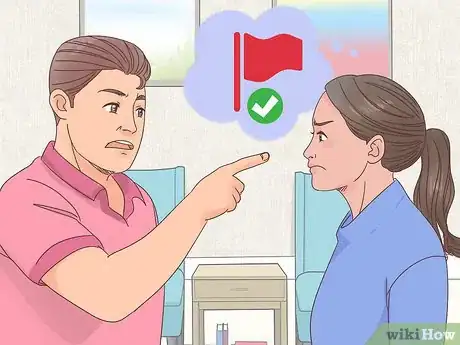

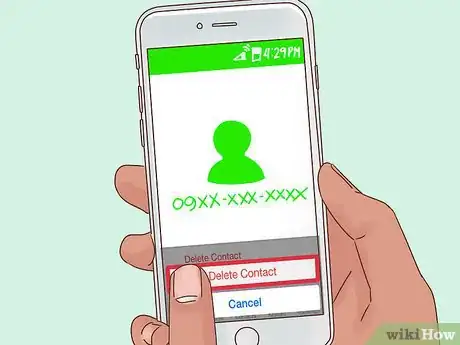

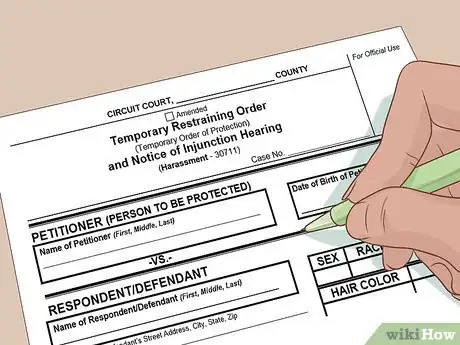
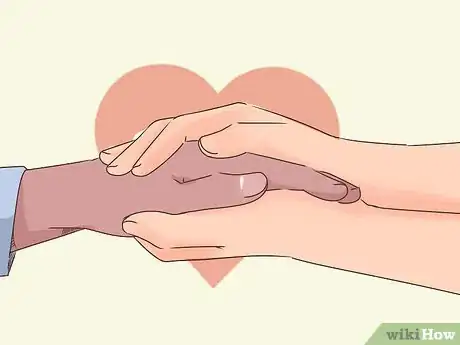








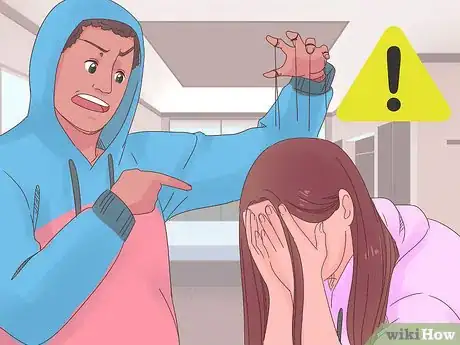


































































Medical Disclaimer
The content of this article is not intended to be a substitute for professional medical advice, examination, diagnosis, or treatment. You should always contact your doctor or other qualified healthcare professional before starting, changing, or stopping any kind of health treatment.
Read More...